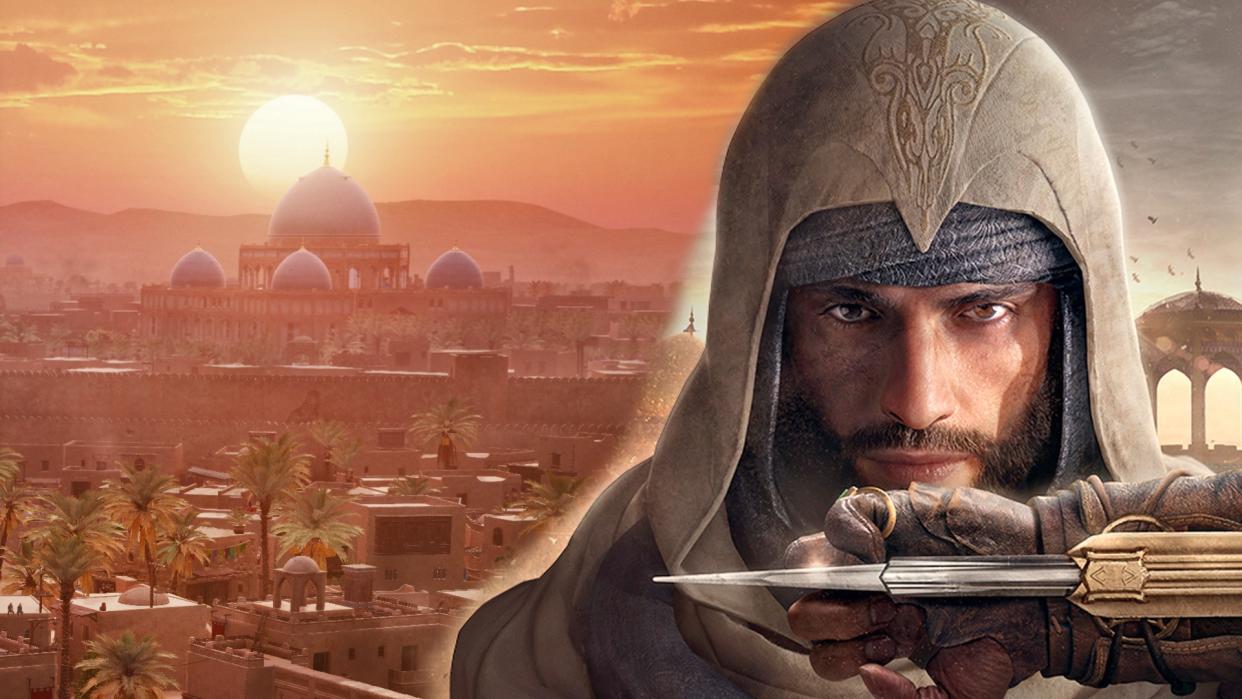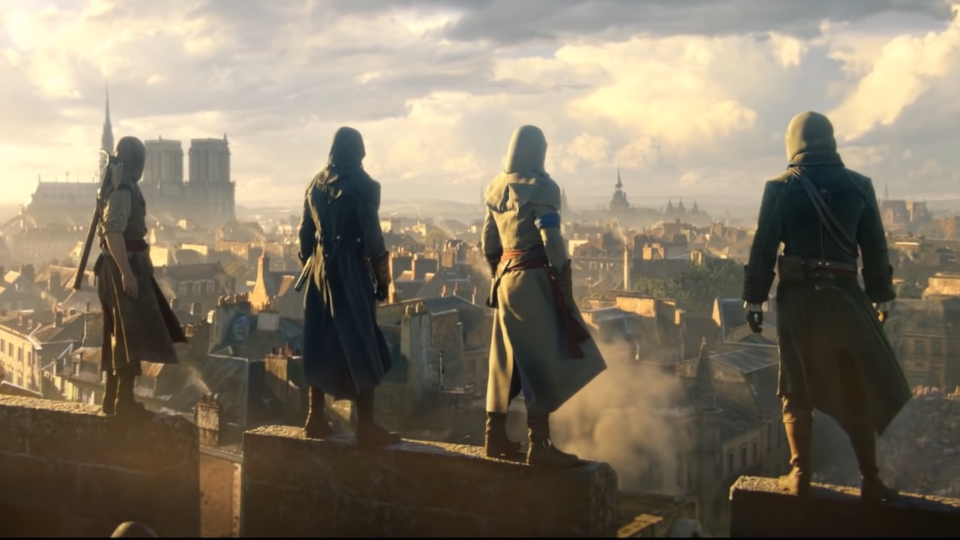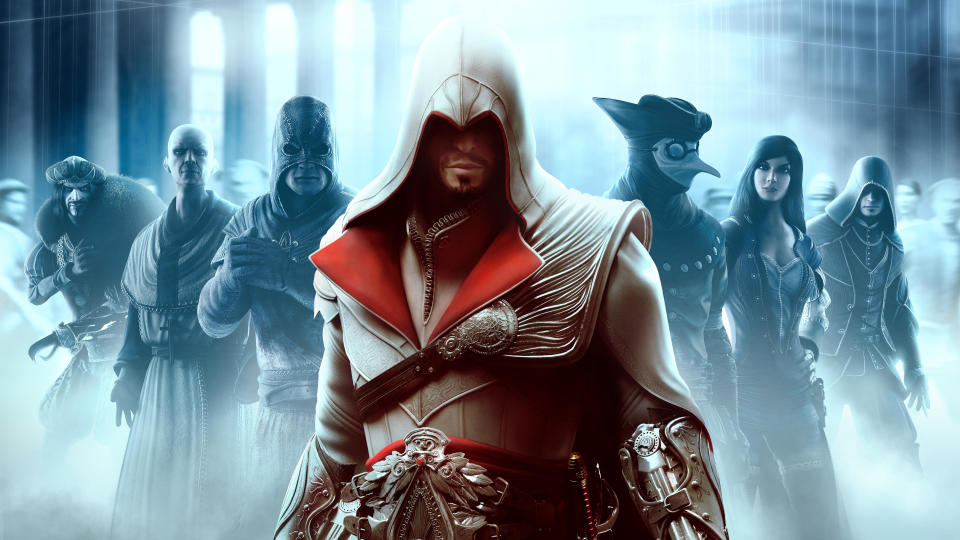Assassin’s Creed Infinity isn’t a game, but it might be a way to sell you NFTs

Over the weekend, Ubisoft announced somewhere between 900 to 1,000 upcoming Assassin’s Creed titles. I forget the exact number.
Feudal Japan, medieval Baghdad, and some dark, spooky woods were all showcased, demonstrating the publisher’s grand plans for the franchise over the next few years – beginning with Assassin’s Creed Mirage. The sheer volume of announcements must have felt like a round of late-game Civ to other major publishers watching. Think it was just one missile cruiser we had outside your capital? Nah, mate. Seven. Your move.
But the most enigmatic bit of the showcase was Assassin’s Creed Infinity. It’s not a game, says Marc-Alexis Coté. It’s a platform for “premium flagship” single-player AssCreed games, and it’s where the meta-story, all the modern-day stuff, takes place.
“Infinity is going to be a hub,” said Coté during UbiForward, “that will unite all our different experiences and our players together in meaningful ways.” And while that hub is intended to host bespoke multiplayer experiences, it’s not in itself a multiplayer game. Because it’s not a game.
So what is it? Eurogamer digs deeper into this question in an interview with Coté, but even over the course of those questions, Infinity’s nature is left vague. And when things are left vague, we get to theorizing.
Crystal clear
Remember back in 2021 when Ubisoft announced Quartz Digits? It was the company’s first foray into NFTs, in the form of unique player items available to buy and sell in Ghost Recon Breakpoint.
The reaction to this announcement was, to borrow a phrase from the world of reviews aggregators, overwhelmingly negative. Production of these items for Breakpoint ceased just four months after it began, in March 2022, amid unimpressed press coverage and little player uptake.
I think gamers don’t get what a digital secondary market can bring to them
Ubisoft acknowledged that its initial outreach into blockchain territory hadn’t been successful. In January 2022, the publisher’s Strategic Innovations Lab VP Nicolas Pouard reflected on the wider reaction to Quartz Digits: “I think gamers don’t get what a digital secondary market can bring to them. For now, because of the current situation and context of NFTs, gamers really believe it’s first destroying the planet, and second just a tool for speculation.

“But what we [at Ubisoft] are seeing first is the end game. The end game is about giving players the opportunity to resell their items once they’re finished with them or they’re finished playing the game itself. So, it’s really for them. It’s really beneficial. But they don’t get it for now.”
When Breakpoint’s NFT content ceased, a statement on the Quartz website read: “Stay tuned for more updates with features to the platform and future drops coming with other games.”
Ubisoft’s been fairly clear, then: it has a long-term plan for NFTs that extends beyond little old Ghost Recon Breakpoint, a relatively low-profile IP in the company’s portfolio, and thus a relatively low-damage test site for its initial experiment.
With this in the background, might NFT creation and exchange form part of the context for Assassin’s Creed Infinity?
One thing Coté did speak to was compatibility. Crossover stories could be easier to produce in Infinity, he says. The popular crossover stories in Assassin's Creed Odyssey (which you can grab for free) and Assassin's Creed Valhalla came about through happenstance – the Origins pipeline hadn’t been totally shut down and archived due to the pandemic, so it was easier than it might ordinarily have been on a technical level to produce that interlinked DLC. But what if all flagship AssCreeds sat on one platform? It’s an opportunity to tell more crossover stories, and also to bring back old titles from previous console generations, all sitting in the same architectural ecosystem.

And that, of course, also means the potential to take items from one game and carry them over into another. A unique sword that you earned in Mirage, stored on the Infinity blockchain, which you can wield against the witch-hunters of the Holy Roman Empire in Hexe.
That’s as compelling a case for the use of NFTs as gaming has right now. Using the context of the Animus, it makes thematic sense. Taking disparate artifacts from history’s broad timeline, and consolidating them in one present-day sci-fi construction. Playing as characters from past games, even, and entering new spaces. One-off Edward Kenways and Ezio Auditores, invading the temporal status quo of Victorian London or revolutionary France.
Back in the hood
The Animus is certainly a focus of Infinity, and the intention is to tell deeper stories in the present-day on the platform, but they won’t technically be playable. What’s the alternative, then? A player-curated space? Something similar to what F1 22 tried to introduce with its F1 Life mode, where a customizable environment is built out of player items?
What we do know is that Infinity will be a marketplace. “if you're playing Red and Hexe comes out,” Coté told Eurogamer, “then you'll see it available as a new DNA memory that's available for you, and you can directly purchase it from the Infinity hub.”
The meta story is a divisive element of the franchise that some want much more focus and depth on, and others endure through gritted teeth
It’s also clear that Infinity won’t just be a marketplace. Coté’s comments about multiplayer, that online experiences will be available – without being tied to single-player content and thus underloved at dev stage and overshadowed at release – makes perfect sense and shows a real practical benefit to a centralized platform. Likewise, having a platform that focuses on the meta story, a divisive element of the franchise that some want much more focus and depth on, and others endure through gritted teeth.
But Ubisoft hasn’t given up on NFTs, and the caution with which it seems to be communicating about Infinity points to a potential soft relaunch for Quartz. Infinity was mentioned, as though in passing, towards the end of UbiForward. It was slipped in next to a mobile game announcement and sold the idea of “our own Animus”. If I was in charge of reintroducing Ubisoft’s NFT initiative, a super-low key announcement that focused entirely on the IP’s benefits rather than the platform specifics is how I’d do it.

